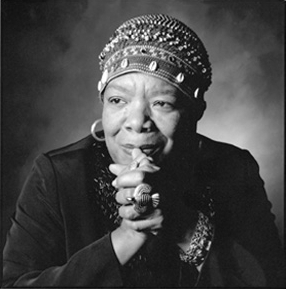Maya Angelou, Chwefror 2009
I left journalism to teach "at risk" children on the Hopi and Navajo reservations, and in the toughest barrios in Tucson. I chose those schools because I grew up on the mean streets of south side Chicago, where dreams all too often died on the vine.
So did some of my friends, far too soon and in heinous, heart rending ways. Some were victims of gang violence or drug abuse. Others were simply victims of those odd, indescribable accidents, illnesses and abuses faced by millions of children of poverty every day.
I had escaped all this, somehow, with the help of loving and resourceful parents and remarkable teachers, like Emmett Till's brave, brilliant mother, Mamie. Teachers like Mamie lit a fire in me -- I still remember watching her turn history into stirring stories of courage in the face of adversity.
As readers my age may remember, Mamie Till Mobley knew something about courage. She had lost her teenage son to a lynch mob and displayed his battered body at the funeral, just as it looked when it was dragged out of the river on that awful day.
She wanted us to see what "ignorance" bred. And she was determined to save her students from both the lynch mob and the ignorance that fueled that awful act.
They were beacons of light in our darkness, those teachers. And they offered us the words of Black authors to take with us on our journeys.
They taught me that words had power. And I used that power as a journalist and author, later -- they all seemed to believe in me before I believed in myself. And I wanted to do the same for my "forgotten" children -- a passing of the torch, so to speak.
I learned quickly that "at risk" children were disdainful and suspicious of the words of the "DWMs" (Dead White Males) most of their English anthologies offered. They did not want to read Twain and Byron and Hemingway. Not at first.
But they learned to love them if they were offered, first, the words of people who looked like them and had lived like them. And if you gave them lots of that, they would begin to tell their own stories.
A poetry slam created and run by my classes at Tucson's Pueblo High School is still a legend among students who were there at the time. It featured dancing and rapping along with readings of original and "best loved" poetry and passages from authors "of color."
And the most popular poem of all, at the slam and in all of my classrooms, not just for the girls, was always Maya Angelou's "Phenomenal Woman."
In an odd coincidence, last week I added a chapter to a novel I'm writing, in which a young woman, like the ones I remember, declares her worth via that same poem. I wrote it in tribute to all the beautiful brown girls who planted their feet, threw their heads back and told us that:
Men themselves have wondered
What they see in me.
They try so much
But they can't touch
My inner mystery.
When I try to show them,
They say they still can't see.
I say,
It's in the arch of my back,
The sun of my smile,
The ride of my breasts,
The grace of my style.
I'm a woman
Phenomenally.
Phenomenal woman,
That's me.
I can still see the girl in back of one room who, upon hearing those words, raised her hand, church style, and cried,
Maya Angelou "preached." To young girls like her, to heads of state, to the world-at-large, beginning at a time when the voices of Black folks -- of all people of color -- were not often heard.
She was a phenomenal woman. Indeed.
Image credit: Wikipedia

